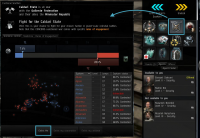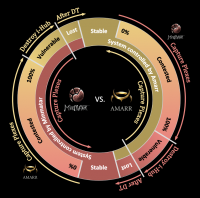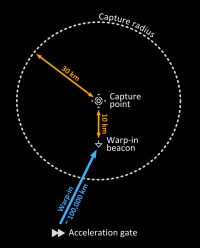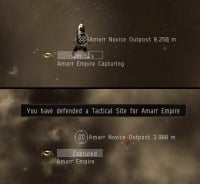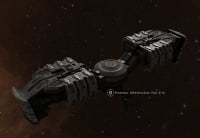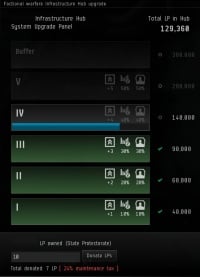Difference between revisions of "Tutorial - New Player Experience - until Aug 2018"
m |
|||
| Line 125: | Line 125: | ||
[[File:FacWar Infra Hub upgrade dialog.jpg|200px|thumb|right|A system can be upgraded by donating loyalty points (LP) at the system's infrastructure hub. This system is currently at Level 3, nearing Level 4.]] | [[File:FacWar Infra Hub upgrade dialog.jpg|200px|thumb|right|A system can be upgraded by donating loyalty points (LP) at the system's infrastructure hub. This system is currently at Level 3, nearing Level 4.]] | ||
Players participating in Factional Warfare can donate the [[LP|loyalty points (LP)]] they earned with their militia corporation (see [[#rewards]]) to "upgrade" the star systems which their faction currently controls. To do this, they must fly to the system's [[#infrastructure hub]], right-click on it, and select the "donate" option, and select how much LP you would like to donate. This window also lists the benefits of upgrading a system: | Players participating in Factional Warfare can donate the [[LP|loyalty points (LP)]] they earned with their militia corporation (see [[#rewards]]) to "upgrade" the star systems which their faction currently controls. To do this, they must fly to the system's [[#infrastructure hub]], right-click on it, and select the "donate" option, and select how much LP you would like to donate. This window also lists the benefits of upgrading a system: | ||
| − | * lower | + | * lower broker fees for contracts and market orders (-10% per system upgrade level) |
| − | * lower clone | + | * lower medical clone costs (-10% per system upgrade level) |
| − | * more industry slots | + | * more industry slots (+1 per upgrade level) |
When you donate LP, a part is lost as a "maintenance tax" (for example, if you donate 1000 LP, and the maintenance tax is 5%, then only 950 LP are actually counted towards upgrading the system). The maintenance tax starts at 0% and increases the higher the [[#warzone tier]] is, up to about 75%<ref>[https://forums.eveonline.com/default.aspx?g=posts&m=3630457 EVE Forums: maintenance tax]</ref>. The LP you donate is put into a pool with the LP donated by other players from your faction in that system, and the size of that pool determines the system's upgrade level (for example, in the screenshot on the right, Caldari militia members have donated a total of 129,360 LP in that system, which equates to an upgrade level of 3. In order to each level 4, they would have to donate an additional 10,640 LP to bring the total to at least 140,000 LP.). A system can be upgraded up to level 5. | When you donate LP, a part is lost as a "maintenance tax" (for example, if you donate 1000 LP, and the maintenance tax is 5%, then only 950 LP are actually counted towards upgrading the system). The maintenance tax starts at 0% and increases the higher the [[#warzone tier]] is, up to about 75%<ref>[https://forums.eveonline.com/default.aspx?g=posts&m=3630457 EVE Forums: maintenance tax]</ref>. The LP you donate is put into a pool with the LP donated by other players from your faction in that system, and the size of that pool determines the system's upgrade level (for example, in the screenshot on the right, Caldari militia members have donated a total of 129,360 LP in that system, which equates to an upgrade level of 3. In order to each level 4, they would have to donate an additional 10,640 LP to bring the total to at least 140,000 LP.). A system can be upgraded up to level 5. | ||
Revision as of 20:24, 16 May 2014
Note: this is my draft copy of an overhauled page on Factional Warfare.
Contents
Factional Warfare
Factional Warfare (sometimes also called Faction Warfare) is a game mechanic whereby you can sign up to fight for one of the four empire factions (against its enemy faction) for control over certain areas of low-sec space. It was first introduced in the Empyrean Age expansion (2008) to offer players a stepping-stone into PvP (player-vs-player) gameplay.
Factional Warfare is primarily centered around two #war zones (areas of low-sec contested by two empires): the Amarr-Minmatar war zone and the Caldari-Gallente war zone, which each are located on the border of the two respective empires. In these war zones, players who participate in Factional Warfare attempt to #conquer star systems for their empire, and are rewarded with #loyalty points and increased #faction standings for their efforts. Additionally, as players who participate in Factional Warfare are effectively at war with two of the four empire factions in the game, they can therefore attack (and be attacked by) players fighting for the enemy factions anywhere in New Eden, as well as fight the enemy NPC faction navies (who patrol the high-sec star systems belonging to their faction).
Joining Factional Warfare
There are two ways to join Factional Warfare (the game calls this "enlisting"): join as a solo player, or join as part of a player corporation or alliance.
Joining as a solo player
Any player can join Factional Warfare provided that:
- They have a regular paid EVE account (trial accounts may not join), and
- Their standings towards the empire faction (e.g. the Gallente Federation or the Caldari State) they wish to fight for must be 0.0 or greater. Note that only raw, unmodified standings (i.e. without taking the effects of skills like
 Social into account) count; you can check your standings on your character page.
Social into account) count; you can check your standings on your character page.
You can enlist at any station belonging to the empire faction you wish to fight for by opening the "Militia Office" window (from the NeoCom or the Station Services window). Note that even through the Khanid Kingdom and the Ammatar Mandate are affiliated with the Amarr Empire, they do not count as being a part of it, and therefore you cannot join Factional Warfare from their stations.
If you join as a solo player, you will leave your current corporation (be it a player-run or NPC corporation) and automatically join one of the four militia corporations (NPC-run corporations which are populated exclusively by other players enlisted in Factional Warfare for a given empire):
- Amarr: 24th Imperial Crusade
- Caldari: State Protectorate
- Gallente: Federal Defence Union
- Minmatar: Tribal Liberation Force
Joining as a solo player happens immediately, unless you have roles in a player-run corporation (in which case it takes at least 24 hours to relinquish your roles and leave your corporation).
Joining as a corporation
The CEO or Director of a corporation can enlist their entire corporation (i.e. all their members) in Factional Warfare to fight for one of the four empires. As with solo players, the corporation must have a standing of 0.0 of greater towards the empire they wish to fight for (corporation standings are an average of of its all the members' individual standings, see corporation standings for more details). Enlisting a corporation takes effect after the next downtime.
It's not possible for individuals in a player-run corporation to either join Factional Warfare on their own (they have to leave their corporation and join one of the militias, see above) or to opt out of Factional Warfare if their corporation joins (if the corporation joins, every member of that corporation automatically joins too).
Factional alliances
Factional Warfare revolves around two conflicts, one between the Amarr and the Minmatar, and the other between the Caldari and the Gallente. Additionally, the Amarr and the Caldari are allied (as are the Minmatar and the Gallente), which means that pilots fighting for (for instance) the Gallente can also help their Minmatar allies fight against the Amarr (with a few exceptions, see #infrastructure hub), and attack (and be attacked by) pilots fighting for the Amarr as well as the Caldari. Additionally, that same pilot would be attacked by the #faction navies of the Amarr and the Caldari should he enter their high-sec space.
Capturing systems
The core mechanics of Factional Warfare revolve around capturing and holding star systems in the #war zones. This occurs in two steps:
- Attacking and completing #complexes ("plexes") in a system to make the system vulnerable to capture.
- Once the system is vulnerable, attack and destroy ("capture") the system's #infrastructure hub (also known as an "i-Hub") to capture the system.
A system starts off as "stable" (or "uncontested"). The attacking faction (for instance, pilots flying for the Gallente attacking a Caldari-held system) must first attack and complete complexes in the system (this is known as "offensive plexing"); for each completed complex, the system becomes ever more "contested" (commonly quoted from 0% to 100%, sometimes also measured in #victory points). Once a system has become 100% contested, it is listed as "vulnerable", and the attacking faction can then attack the system's infrastructure hub. Once the infrastructure hub is destroyed, the system is considered "lost" and will switch to the attacking faction's control after the next downtime (DT).
During this time, the defending faction can also complete complexes in the system (this is known as "defensive plexing"); for each completed complex, the system becomes ever less "contested" (or, if it's currently "vulnerable", it will revert to being "contested"), all the way back to "stable".
While a system is "vulnerable" or "lost", the attacking faction may still capture plexes, but they will not get any #reward nor affect the system's capture. Additionally, once a system is "vulnerable", the defending faction needs only to capture a few complexes to revert the system to "contested" (and therefore render the infrastructure hub invulnerable again); the attacking faction cannot create a "buffer" against this by capturing more complexes while the system is "vulnerable". Similarly, the once the defending faction has capture enough complexes to revert a system to "stable", the attacking faction only needs to capture one complex to put the system back to "contested".
Obviously, in addition to the mechanics above, pilots can (and should!) attack the other faction's pilots to stop them from completing their objectives!
Complexes
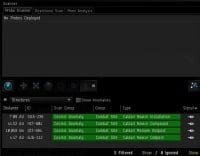
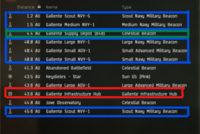
- Red: #Infrastructure hub
- Light blue: #Complexes (one medium and one small) which have already been visited
- Orange: #Mission beacons
Factional Warfare Complexes (commonly known as "Plexes", not to be confused with PLEX) are small areas of deadspace in war zone star systems. They are a type of Cosmic Anomaly, which means that they show up on the system scanner (but do not need scan probes to find), although once someone has warped to a complex, they will also show up on the Overview (even if someone initiated a warp to them, but cancelled it immediately).
Like all Deadspace Complexes, you cannot warp directly into them, but must first use an acceleration gate, after which you will land at the complex' beacon. Also, you cannot light a cynosural field inside a complex. At the center of each complex, a few kilometers away from the beacon, is the capture point (sometimes called a "button"). An NPC ship belonging to the faction controlling the star system will be defending the complex.
Capturing complexes
In order to capture a complex, you must first clear the area (radius: 30 km) around the capture point of enemy ships. If you're the attacking faction, this includes killing the defending NPC; if you're the defending faction, the NPC will obviously not fire on you, and you therefore you shouldn't destroy it (even if it appears as "hostile" on your overview)!. Then you must stay inside the capture radius (within 30 km of the capture point) until the complex' timer has counted down to 0 (you can see how much time is left by selecting the capture point), at which point you will have captured the complex!
Additional ships from your faction will not make the timer count down faster; if you leave the complex, the timer will pause (but will not reset). If an enemy ship enters the complex, the timer will also pause until ships from only one faction are present in the complex, and then it will resume counting down. Note that the timers for both factions are additive - so if a Caldari pilot has spent three minutes capturing a complex, and is then destroyed by an incoming Gallente pilot, the Gallente pilot would have to spend an extra three minutes in the complex in order to capture it (in order to "undo the capturing" previously done by the Caldari pilot, so to speak).
Ships which are cloaked cannot capture complexes (the timer will pause as soon as the ship cloaks, but will unpause if the ship decloaks). Neutral pilots (i.e. pilots who are not enlisted in a militia) can enter a complex, but cannot capture it (their presence doesn't affect the complex' timer). Pilots in a militia can capture complexes in their ally's warzone, but only on their ally's behalf (so, for example, a pilot fighting for the Minmatar could go to the Caldari-Gallente warzone and capture a complex on behalf of their ally (the Gallente)).
Once a complex has been captured, it disappears from the scanner/overview and despawns after a few minutes. A new complex of the same size will spawn about 30 minutes after the previous one was captured (with the exception of large complexes, which appear to spawn at random). Therefore, if many players have been active in a system recently, it may be the case that, for a brief time, there are no complexes available to capture.
Complex types
Complexes come in four types, often called "sizes" (which is a bit of a misnomer, as the physical dimensions of the complex are always the same). They vary in what ship classes are allowed to enter, what NPC defends them, and how long it takes to capture them. While each type of complex contributes the same amount to capturing a system (see #victory points), capturing larger complexes result in higher #rewards. Additionally, capturing complexes in enemy-held systems gives higher rewards than capturing complexes in friendly-held systems.
| Type | Capture time | Allowed ships | NPC defender |
|---|---|---|---|
| Novice | 10 min | T1 and Faction frigates Industrials (no rookie ships) |
Frigate |
| Small | 15 min | Frigates Destroyers |
Destroyer |
| Medium | 20 min | Frigates and Destroyers Cruisers and Battlecruisers (no T3 cruisers) |
Cruiser |
| Large | 20 min | Unrestricted | Battlecruiser |
Complexes are defended by a single NPC (in rare cases, two); it's designed to be killed without too much trouble by a player ship of similar size. Once killed, the NPC defender will not respawn.
Infrastructure Hub
The Infrastructure Hub (or "i-Hub") is a structure in space which the attacking faction needs to destroy in order to capture a system. The i-Hub can be found (and be warped to) from the Overview, but can only be damaged if the star system is in a "vulnerable" state (see #Capturing systems), and then only by pilots of the attacking faction (pilots of the defending faction, pilots in an allied militia, or neutral pilots cannot damage the i-Hub).
The i-Hub has 25 million hitpoints (HP), with 7.5M HP each in shield and armor, and 10M HP in structure[1]. This means that a medium-sized fleet is needed to destroy an i-Hub in a reasonable period of time (keeping in mind that its peak shield recharge rate is around 1700 HP/s, which is the absolute minimum amount of DPS needed to break through its shields). Once the i-Hub is destroyed (technically, once it reaches 1% structure), the system will be "lost" and will switch to being occupied by the attacking faction after the next downtime.
As explained above (#Capturing systems), if a system is "vulnerable", and if the defending faction can capture enough complexes, the system will revert back to "contested". The i-Hub will then become invulnerable again, and any damage which the attacking faction has so far managed to do to it is reset. Therefore, while attacking the i-Hub, the attacking faction must also prevent the defending faction from capturing complexes.
The i-Hub is also the place where pilots of the defending faction can donate loyalty points to upgrade the system, see #System upgrades.
Victory points
Formally, how "contested" a system is is measured in how many victory points have been accumulated by the attacking faction for that system. If the attacking faction has not yet accumulated any victory points for that system, then the system is "stable" (see #capturing systems), and if they then capture a complex (regardless of its size) they are rewarded with 20 victory points[2] (conversely, if the defending faction captures a complex, 20 victory points are subtracted). In order to bring a system to "vulnerable", the attacking faction must accumulate 3000 victory points (i.e. capture 150 complexes more than the defending faction).
If a star system has one or more temperate planets, then players in DUST 514 can make a system easier or harder to capture. The more planetary districts on those planets are controlled by DUST 514 players fighting for the attacking faction, the lower the number of victory points needed to capture a system (and, conversely, the more districts are controlled by the defending faction, the higher the number). This mechanic can modify the number of victory points needed to capture a system by up to 12.5% per temperate planet[3] (for example, a system with two temperate planets where the attacking faction militia controls all the districts will require 3000 - (12.5% * 2) = 2250 victory points). Star systems without temperate planets always require 3000 victory points to capture.
System upgrades and warzone tier
System upgrades
Players participating in Factional Warfare can donate the loyalty points (LP) they earned with their militia corporation (see #rewards) to "upgrade" the star systems which their faction currently controls. To do this, they must fly to the system's #infrastructure hub, right-click on it, and select the "donate" option, and select how much LP you would like to donate. This window also lists the benefits of upgrading a system:
- lower broker fees for contracts and market orders (-10% per system upgrade level)
- lower medical clone costs (-10% per system upgrade level)
- more industry slots (+1 per upgrade level)
When you donate LP, a part is lost as a "maintenance tax" (for example, if you donate 1000 LP, and the maintenance tax is 5%, then only 950 LP are actually counted towards upgrading the system). The maintenance tax starts at 0% and increases the higher the #warzone tier is, up to about 75%[4]. The LP you donate is put into a pool with the LP donated by other players from your faction in that system, and the size of that pool determines the system's upgrade level (for example, in the screenshot on the right, Caldari militia members have donated a total of 129,360 LP in that system, which equates to an upgrade level of 3. In order to each level 4, they would have to donate an additional 10,640 LP to bring the total to at least 140,000 LP.). A system can be upgraded up to level 5.
You can check the current upgrade level of a system (along with the associated benefits) through the system information display at the top-left of the screen. Here you can see who currently controls the system, the system state (stable / contested / vulnerable / lost, see #capturing systems) and its upgrade level, as well as the influence of DUST 514 players on the system (see #victory points).
Beyond providing benefits for the system itself, upgrading star systems also contributes to the overall #tier of the war zone, which can bring additional benefits.
The amount of LP in a system's pool is reduced every time a player from the enemy faction captures a complex in that system; 50% of the LP #reward they receive is subtracted from the system's LP pool. For example, a Gallente pilot captures a novice complex in a Caldari-held system. The Gallente pilot is rewarded (say) 10,000 LP for her efforts, and hence, the Caldari LP pool for that system is reduced by 50% of that (5,000 LP in this case). If the amount of LP in the pool drops below the threshold required for the current system level, then the system's upgrade level will drop accordingly. The defending faction can counteract this by donating more LP to the pool; even if the system is at level 5, they can continue donating LP into a so-called "buffer" (i.e. more LP than is needed to reach level 5) to stop the system dropping to level 4 as soon as one enemy pilot captures a complex.
Faction Tier
The more systems in a #war zone a faction controls and the more those systems are #upgraded, the higher the #rewards the pilots who fight for that faction receive. This is represented by the "faction tier" mechanic: each faction receives a point for each system they control in their war zone, plus an additional point for every system level upgrade (so an un-upgraded system is worth 1 point, a system upgraded to level 1 is worth 2 points, a system upgraded to level 2 is worth 3 points, a system upgraded to level 3 is worth 4 points, and so forth).
The number of points a faction has is then compared to the total number of available points in a war zone (which is equal to the number of systems in the war zone multiplied by 6 (as a system can be upgraded up to level 5, and a level 5 system is worth 6 points)).
- Amarr-Minmatar war zone: 70 systems (420 points available)
- Caldari-Gallente war zone:
Hence, the number of points a faction has determines the its tier:
- 0-20% of the total number of available points: Tier 1
- 21-40% of the total number of available points: Tier 2
- 41-60% of the total number of available points: Tier 3
- 61-80% of the total number of available points: Tier 4
- 81-100% of the total number of available points: Tier 5
The main effect of warzone tier is that it affects how many loyalty points you receive for various activities you do in Factional Warfare; the higher your faction's tier, the higher your #rewards.
- Tier 1: -50% LP rewards
- Tier 2: (no effect)
- Tier 3: +75% LP rewards
- Tier 4: +150% LP rewards
- Tier 5: +225% LP rewards
For example, the base reward for capturing a novice complex in an enemy-held system is 10,000 LP. If your faction is at Tier 1, then you will only receive 5000 LP, while if your faction was at Tier 4, you would receive 25,000 LP for capturing that same complex! This bonus affects all activities which reward Factional Warfare LP, notably #capturing complexes and #running missions.
Factional Warfare missions
Each of the four Factional Warfare corporation ("militias") have a number of agents which offer missions to pilots enlisted with their militia (and their allied militia). These missions work similarly to the encounter missions offered by agents of other corporations, although there are a few notable differences (detailed below). Note that even though these missions are run in the #war zones, they do not contribute to capturing or defending star systems in those war zones.
Finding, accepting and rejecting missions
Avail to militia and allied militia only. List of agents through agent finder. Access to higher lv agents by standings with FW corp (militia) - for agents in allied militia need standings to allied militia corp. No storyline mission. No penalty for rejecting missions.
Running missions
Always military encounter mission (no mining or courier) - go somewhere, kill something. Generally in deadspace pocket. Always in enemy half of war zone in low-sec, i.e. many jumps through low-sec. Beacon visible to all at mission location - anyone can warp to your mission objective. Mission difficulty like highsec-1; ship restrictions like highsec. Killing enemy faction ships will cause further damage to standings with enemy factions, see detailled mission description in eve-survival.
Completing missions
Can complete remotely (at any station). Receive standings increase, ISK and LP reward (as regular missions). Reward- and standings-increasing skills work as normal. Note that LP rewards scale with #faction tier.
Rewards
A discussion of all rewards (linked to from plexes and missions)
Plex rewards Must be in range when plex is completed (no rewards for partially completing plex). Rewards shared between pilots in plex. Offensive and defensive
FW stores (historical: prices used to be linked to war zone tier; this is no longer the case. However, prices are still cheaper than in normal stores (examples!)) Rewards for flipping a system (destroying i-Hub)?
LP rewards reduce enemy system upgrade pool (but rewards are still paid out normally even if the upgrade pool is empty)
War zones
Description of war zones. Regions, constellations.
Permanent war
Effects of being in a permanent war
Enemy militia
You can kill enemy militia (and they can kill you) without losing sec status or CONCORD intervention (in high-sec).
Will attack you if you enter highsec systems controlled by enemy factions Cannot dock in enemy-held stations
- FW UI elements (FW window, system info)
- overview settings
- finding plexes (overview & scanner)
- maps (ombeve, dotlan)
- mechanics of capturing systems, contested/vulnerable/stable states (and how to move between them), victory points
- tier and system levels, what affects them
- FW corps (player corps, militias), ranks
- LP store, LP rewards
- missions (probably link to a separate page)
- damage types
- effect on aggression: who you can shoot without repercussions, WT in high-sec,
- faction navy (not CONCORD)
- geography of warzones (which regions; link to Dotlan)
- how FW impacts your standings (faction / FW corp)
- Split off a separate page on strategy and tactics (include the FAQ?)
- plexing: check whether it's on the overview ("visited")
- i-Hub bash: SB does about 300-400 dps, battleship 600-800 dps, tier 3 battlecruiser 600-800 dps
- choose plex size to fight particular ship classes
- D-scan!!
- maximising profit (donating LP, LP rewards scale with tier, cashing out)
- system upgrades rarely worth it
- FW ranks, standings towards your militia. ranks only gained with your own militia.
- generally check the page on FW standings
Classes
References
External links
- Eve Wiki page on FW
- GamerChick42 guide to FW
- Factional Warfare: What is it, what is there in for me? (2009)
